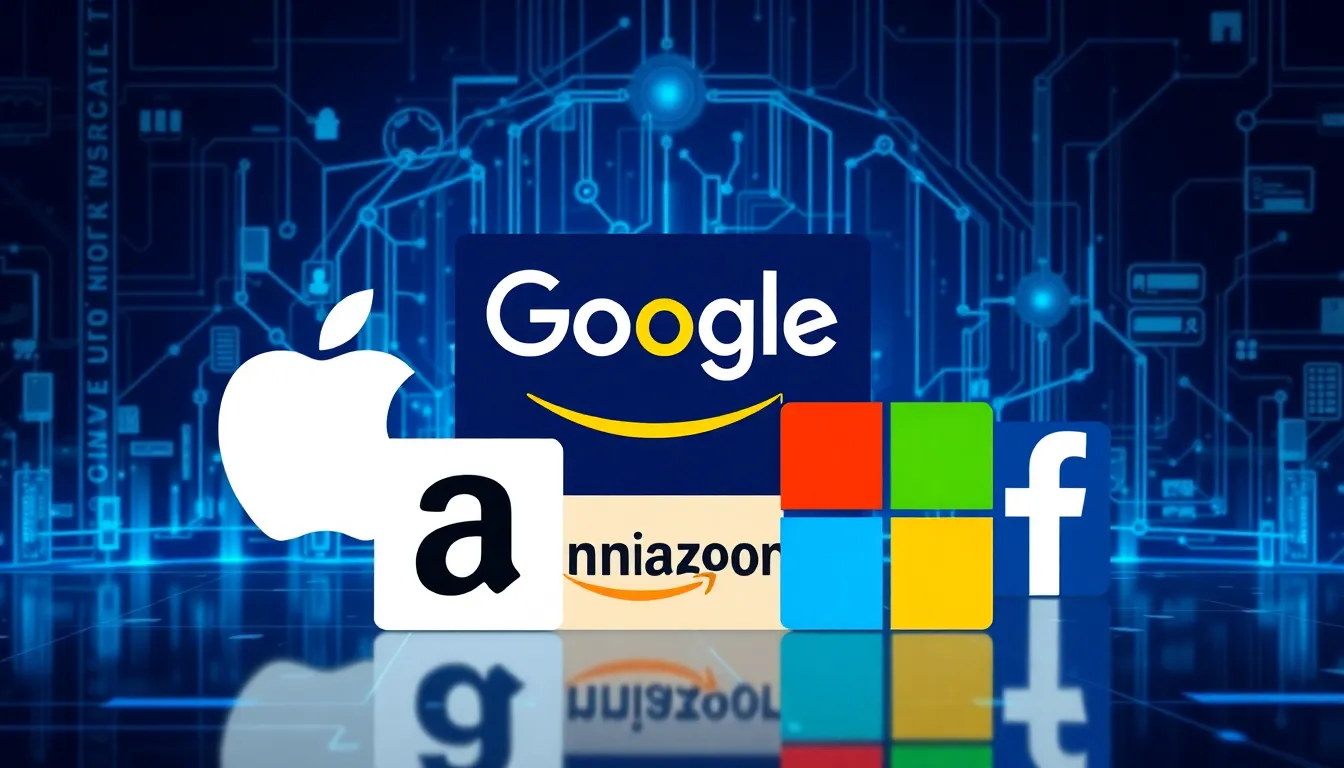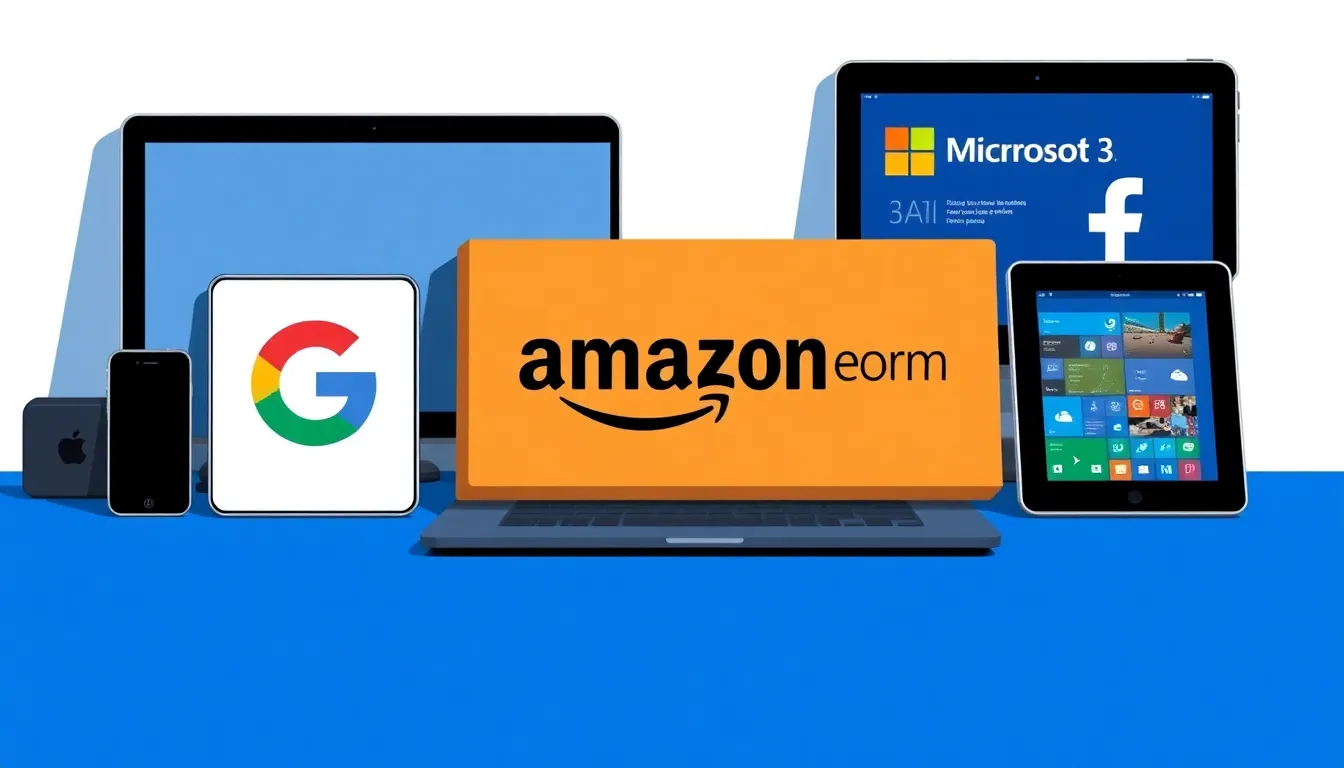In a world where tech giants reign supreme, it’s hard to imagine life without their innovations. From smartphones that fit in pockets to social media platforms that connect billions, these colossal companies shape how people communicate, work, and play. But let’s face it—sometimes their influence feels a bit like having a giant toddler in the room, throwing tantrums and demanding attention.
As they battle for market share and consumer loyalty, the antics of these tech titans can be both fascinating and entertaining. Whether it’s a new gadget that promises to change everything or a controversial policy that sparks debate, tech giants never fail to keep the spotlight on themselves. Buckle up as we dive into the world of these behemoths, exploring their impact on daily life, the economy, and even the future of technology itself. Who knows? You might just find yourself rooting for your favorite tech superhero.
Table of Contents
ToggleOverview of Tech Giants
Tech giants play a crucial role in every aspect of modern life. Companies like Apple, Google, Amazon, and Microsoft dominate the technology landscape. Each entity influences communication, work, and entertainment, shaping how people interact with technology daily.
Apple focuses on innovation in hardware and software design, creating products that redefine user experiences. Google leads in search engine capabilities and digital advertising, providing various services like Google Maps and YouTube. Amazon revolutionizes online shopping with its vast product range and advanced logistics network, making it a household name. Microsoft transforms productivity with its software solutions, including Office 365 and Azure cloud services.
The economic impact of these giants is substantial. They contribute significantly to job creation and GDP growth in various regions. Specifically, tech giants collectively employ millions worldwide, spurring local economies and fostering technological advancements.
Future developments in the tech industry hinge on their initiatives. Innovations such as artificial intelligence, augmented reality, and renewable energy solutions emerge from these major players. Consumers and businesses alike rely on their advancements for increased efficiency and connectivity.
Constant evolution defines the tech landscape. As they expand into new markets, they face challenges from emerging competitors and regulatory scrutiny. With their footprints in several sectors, monitoring their influence remains essential.
Tech giants undeniably drive both societal and economic change. Their scale and reach underscore the importance of understanding their roles in shaping a rapidly evolving technological future.
Major Players in the Industry


Tech giants like Apple, Google, Amazon, Microsoft, and Facebook play pivotal roles in shaping the technological landscape. Each company drives innovation and influences consumer behavior in unique ways.
Apple
Apple leads in creating premium hardware and software, with products like the iPhone and MacBook setting industry standards. Fan loyalty stems from its seamless ecosystem, which enhances user experiences. Innovations in design and functionality position Apple at the forefront of technology trends. Recent shifts toward services—like Apple Music and Apple TV+—have expanded its revenue streams, showcasing the company’s adaptability.
Google dominates the search engine market, processing over 3.5 billion searches daily. The company excels in digital advertising, providing platforms for businesses to reach targeted audiences effectively. Innovations in artificial intelligence, such as Google Assistant, enhance user interaction with technology. Initiatives in cloud computing further solidify Google’s reputation as a leader in diverse tech solutions.
Amazon
Amazon revolutionizes online shopping, boasting over 300 million active customer accounts. The introduction of Prime services reshapes consumer expectations for delivery and convenience. Growth in Amazon Web Services positions the company as a key player in cloud infrastructure. Diversification into areas like grocery delivery and streaming services highlights Amazon’s influence on various sectors.
Microsoft
Microsoft enhances productivity through its software solutions, including Office 365 and Teams. Its shift toward cloud services, particularly Azure, boosts business operations across industries. Innovations in gaming, via Xbox, expand its reach within the entertainment market. Strong commitments to artificial intelligence and machine learning signal Microsoft’s ongoing evolution in technology.
Facebook connects over 2.8 billion monthly users, shaping social interactions worldwide. Ad revenue from targeted advertising significantly impacts the company’s financial success. Developments in virtual and augmented reality, especially through Oculus, highlight its push into immersive experiences. Continuous adaptation to regulatory challenges underscores Facebook’s efforts to maintain user trust and platform integrity.
Impact on the Economy
Tech giants significantly influence the economy by generating jobs, fostering innovation, and enhancing competition across industries.
Job Creation
Job creation stands out as a primary benefit. Major tech companies employ millions directly and indirectly, fueling local and national economies. For instance, Amazon’s workforce exceeded 1.3 million in 2021, reflecting its rapid expansion. In addition, positions related to software development, data analysis, and digital marketing grow at an unprecedented rate. These roles often offer competitive salaries and flexible working conditions. Enhanced job training programs and upskilling initiatives from companies like Google and Microsoft contribute further to workforce readiness, demonstrating the direct link between tech firms and economic growth.
Innovation and Competition
Innovation thrives in environments dominated by tech giants. Each company invests heavily in research and development. Apple, for example, allocated around $22 billion in 2021 alone. Such investments lead to groundbreaking products and services, resulting in significant market shifts. Intense competition among these firms stimulates advancements and encourages smaller startups to innovate. Google’s advancements in artificial intelligence challenge competitors to keep pace or risk obsolescence. As a result, the tech industry’s dynamism not only inspires breakthroughs but also creates new markets, underscoring the essential role of these giants in driving economic progress.
Challenges Faced by Tech Giants
Tech giants encounter various challenges that influence their operations and public perception. Addressing these concerns becomes essential for maintaining their market positions.
Regulatory Scrutiny
Regulatory scrutiny increasingly impacts tech giants. Governments worldwide examine practices related to monopolistic behavior, data protection, and labor regulations. For instance, the European Union has initiated investigations into Google and Facebook over antitrust violations. The scrutiny often results in hefty fines and demands for operational changes. Consequently, tech giants must adapt to new regulations while balancing innovation and compliance.
Privacy Concerns
Privacy concerns represent another significant challenge for tech giants. Users express worries about data collection, usage, and potential breaches. Facebook faced intense backlash over the Cambridge Analytica scandal, highlighting the risks of mishandling personal information. Companies like Apple respond by prioritizing user transparency and control over their data. Failure to address these concerns can lead to loss of trust and customer loyalty, directly affecting revenue streams.
Future Trends
Tech giants are poised to lead the charge in shaping future technology landscapes. Their ability to adapt and innovate directly influences consumer experiences and industry standards.
Emerging Technologies
Industries witness a surge in emerging technologies driven by tech giants. Artificial intelligence is at the forefront, as companies invest heavily in machine learning and automation. Apple, for instance, dedicates resources to advancing AI capabilities within its products, enhancing user experience. Google continues to dominate through its AI algorithms and tools, streamlining everyday tasks for users. Augmented reality also gains traction, enabling immersive experiences in gaming and retail, particularly with initiatives from Facebook and Microsoft. The combination of advancements in cloud computing and 5G technology further powers these innovations, leading to faster data processing and enhanced connectivity. With substantial investments, the groundbreaking potential of these technologies remains high, transforming how individuals interact with digital environments.
Changes in Consumer Behavior
Changes in consumer behavior reflect the direct impact of tech giants. Increased reliance on digital platforms showcases a shift in shopping habits, where e-commerce grows rapidly, influenced by Amazon’s Prime services. Consumers now seek personalized experiences, prompting companies to refine algorithms and user engagement strategies. Mobile devices play a crucial role, with significant traffic originating from smartphones as more people access services on the go. Social media platforms, notably Facebook, shape purchasing decisions through targeted advertising and influencer marketing. Many individuals prioritize sustainability in their choices, urging companies to adopt eco-friendly practices. As tech giants adapt to these evolving expectations, they continuously reshape the market landscape, driving innovation to meet consumer demands.




